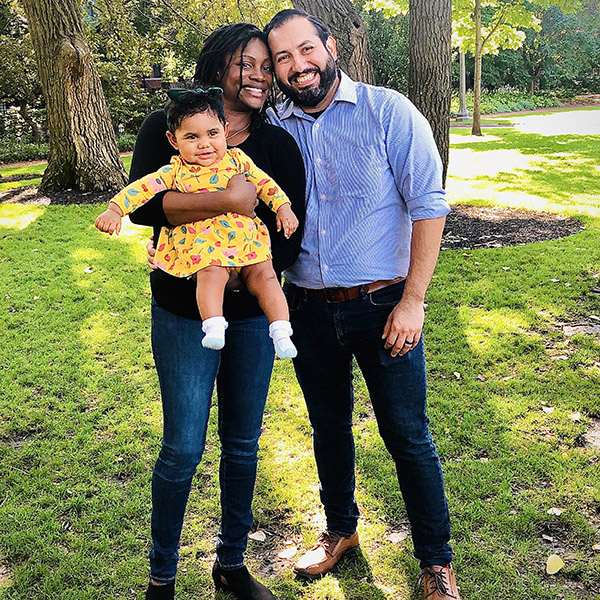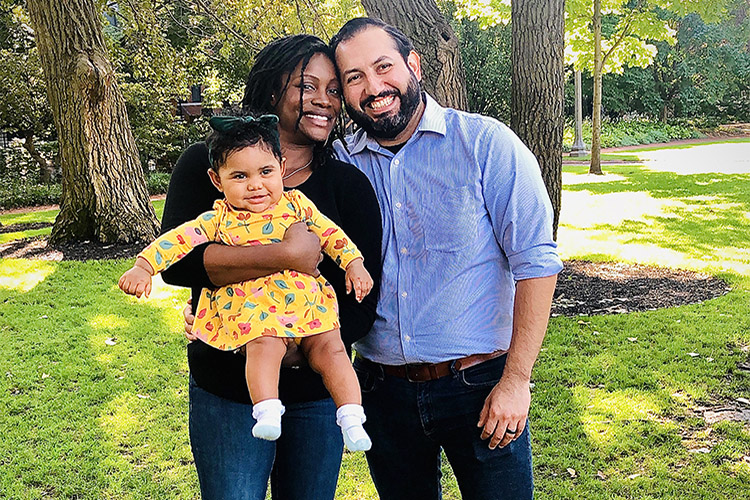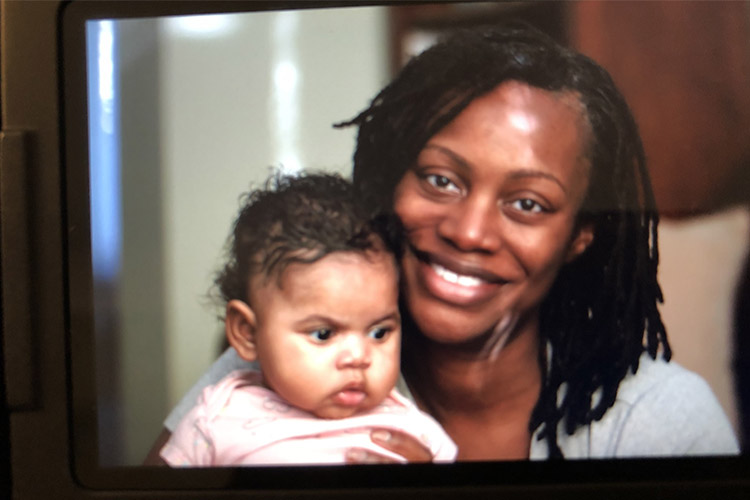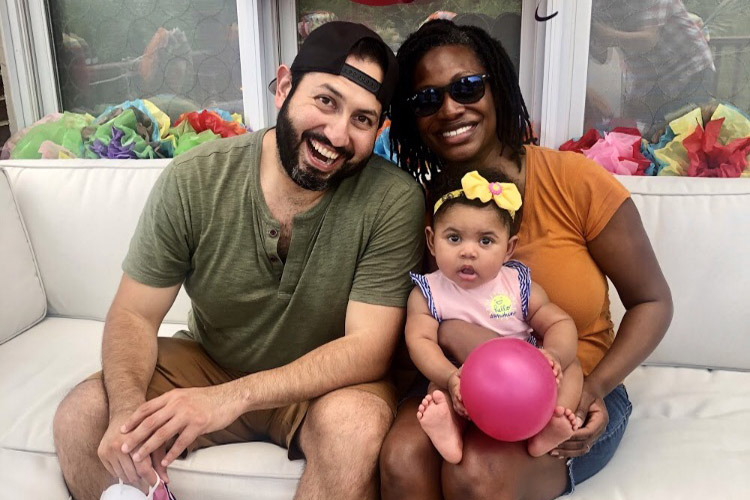Oh, yeah. Yeah, so my name is Ebony Ávila and my daughter is Xochitl Maite Ávila. She is seven and a half months old.
I think the moment that I realized that it was a problem was when I went to the doctor for her two month checkup and I had felt like I would cry and feel emotional, but I thought that it was just my hormones were trying to work it out, right? I had just had a baby and you got all these extra hormones pulsing through you. So I thought, "Okay well that's just what it is." But I go to the doctor and I had makeup on and baby was cute. I was presentable and I was like, "Okay, I got this. This is okay." And she asked me, she's like, "How you doing?" And I just was like, "Okay." And my eyes started to well up with tears and she was, prior to this I hadn't really talked to another mom. It was just me and my husband. I get a little emotional thinking about it because she was so amazing, my doctor was. And I just started crying and I couldn't stop crying. And she was like, "It's okay." Sorry I get emotional thinking about it because it was really hard. It was hard time.
But, I think you have your partner there and they can only do so much. They don't know what it's like. They don't know that you really can't sleep. You really can't sleep because for me the part that made me so anxious was I was always concerned like, "Is she still breathing? Is she still breathing?" Because they breathe so shallow and you're just constantly peeking over to make sure that she's okay. We had our baby later in life, I was 37 when I gave birth. And I was always nervous that something was going to go wrong. First trimester a lot of people don't say anything because things can happen. And so we were mums the word, really nervous. And then first trimester goes through fine. We're getting our ultrasounds. I actually get more ultrasounds because I'm high risk because of my age. And then I develop gestational diabetes towards the end and I'm so worried about this baby that we want so much.
And then she gets here and I'm like, "Whew." I had a great delivery. It was perfectly fine and then she gets here and now I'm like, "Okay she's here. I can sleep." People keep telling me the same thing, "Sleep when the baby sleeps and you got to get some sleep. Make sure you get some sleep." And my mom is like ... people the same thing so I was grappling so much because people told me the same thing and then I'm like, "I can't sleep. I can't sleep." My anxiety was just so high and I didn't know it was anxiety, I thought it was just new mom protectiveness, mama bear. And until I started crying at the doctor's office and I'm like, "Oh, wow yeah this is different. This is a combination of a lack of sleep, anxiety, not taking care of myself. Not eating properly because I'm taking care of this baby that feels like she sleeps two minutes a day." I know she sleeps longer than that, but you can't get anything done because it's a new baby. And mind you, this is during the pandemic when they're talking about isolating, right? So, you got a new one and they're like, "Keep your baby in the house." First it's flu season because she was born in January, so flu season and then now when we're just about to come out of the house they're like, "Hey there's a global pandemic." And we're like, "Okay."
So we stayed in the house some more and the time my mom came in February, that was the last time I have seen my mother since this pandemic because she lives in Kentucky. And we are taking things seriously and taking precautions and trying to be careful. So I didn't have a support system either because my family wasn't here. So, yeah it was tough.
I think so this is going to found kind of funny, but this is just the truth. So I'm on Instagram and I follow different people, different mom pages or whatever, especially now because I just don't have the opportunity to go to a mom group or be with my girlfriends that have kids and swap stories and get experiences from each other. So I try to get what I can in a positive way through social media. And I remember I would sometimes see people posting pictures of themselves crying and talking about how hard motherhood is. I remember when I was pregnant I was like, "It can't be that bad. I'm not going to post a picture of myself crying." I felt very judgmental of those women to be honest with you.
But after becoming a mother and subsequently suffering with anxiety, high anxiety something I had never dealt with before and some postpartum depression, I felt so much sympathy for those women. Those very saying women were inspiration to me when I would read when they would say how hard it was and how they were feeling. I remember feeling that way, having those feelings. So yeah, so it helped me to appreciate that in life you never know where you're going to end up. You never know what is going to humble you and motherhood has truly humbled me and helped me to appreciate that we're more alike than we're different. Because those women in those pictures would have these big diamond rings and be in these beautiful houses and they're crying. I would think ... My mom was a single parent. She raised five children on her own. So I was like, "You want to know what hard is? That's hard."
But then after I became a mother I was like, "Oh." It's an experience and that experience is not singular and it's not ... yeah it's just that it's not singular. It's a shared experience and it's very unique to each mother. But there are a lot of things that are similar regardless of social class and race and all those other things that we like to use to judge people. It's an experience and as women and as a mother I have really tried to be more thoughtful about how I view other people's parenting and then more gentle and reflective with how I parent my daughter.
I think mental health. Having real conversations about mental health, particularly and I can speak for my own personal experience. But particularly in the Black community sometimes is not really talked about. Because even in what I just said, thinking about my mother and her being strong. Just because I didn't see her crying and taking a picture of it and posting it, we just didn't have that technology like that at the time. But it doesn't mean she didn't feel that and it doesn't mean that it's wrong to feel those things. And I think had my mother let me see some of that I probably would have been a little ... and I'm not saying it's my mother's fault or anything like that. But I'm just saying the experience of letting people see us be vulnerable would be helpful because women very often I feel like we do so much. Not very often, we do. We do so much. We carry so much around. Even me I wake up at 5:30 in the morning just to do my nails, right? And take care of myself because my day is packed, it's jampacked. And every woman I know that's the case.
So sometimes you cry in the shower or you talk to a friend. But you don't let people see it, especially again my personal experience, especially women with color. We hold it together. We keep it together. We keep going, we push through. And as much as that is part of our character and who we are, we're also human and we also feel things. And when you are a mother or any caretaker that is taking care of someone that you really love it is hard. It's hard and I think being open and honest about that as a Black woman telling my friends, "Hey you know what?" After they just had a baby, checking in on them. "Hey, how you doing? How you feeling? What do you need?" And letting them know it's okay if you don't feel good. It's okay if you're tired I was really, really tired. So tired my mom took a bus from Kentucky to take care of my baby so that I could go to a hotel and sleep because I had so much anxiety I couldn't sleep and I was crying a lot and I thought my experience was atypical. I talked to my doctor and she's like, "Nope, a lot of women experience that," and I didn't know. I just didn't know.
And so I tried to be vocal about my struggles and not make it something shameful or no, I just snapped right into motherhood and it was great and I love my baby. Of course, all mothers love their babies. But it's hard. It's hard. So, I'm talking about it to you now because I don't know who's going to hear this, what other Black mother may hear this or what other woman may hear this that feels like she can't just let go. But that's the healthiest thing you can do is ask for help and if you need to cry or you need to sleep, that's okay. And ask people to help you get that done. I think that's just been so important to me because I had no idea. I just didn't know and I think if I would have heard somebody say, "It's going to be a little rough in the beginning," and tell me what that meant, then I probably wouldn't have felt so alone because I felt a little alone at the beginning. I've never heard anybody say they dealt with this. So, yeah I think communication and being open and honest with your experience is just helpful.




